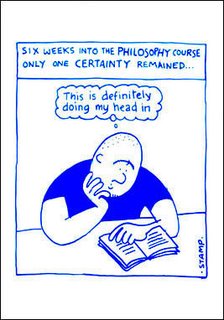
Whilst working with a group of senior project and programme managers yesterday the issue came up about whether their organisation was in a certainty, risk, uncertainty or choas situation at the moment. The discussion raged for some time with small groups arguing that thier company was infact firmly in one of the states of either certainty, risk, uncertainty or choas, each bringing their own evidence to bear on the discussion. Firstly it was interesting that the certainty camp, whilst vocal were actually in the minority compared to the other three groups.
What was really interesting about this discussion were the perceptions of reality being put forward. The whole group stopped when I suggested that actually it was most likely that the organisation is and always was in all four states at the same time. It was just that the perceptions differed depending on what was happening for the individuals at the time and how close to their prime fears they were. In other words their focus was on the presenting symptoms as they as individuals saw them, the importance of which were largely determined by their emotional reaction to the situation. When we examined what each of them were noticing around them this was borne out.
The very first problem when problem solving is: do you actually have the problem? Is our view of reality real? When you examine the demise of companies it is usually revealed that the board were fooling themselves about the current situation. So how do you get to reality?



